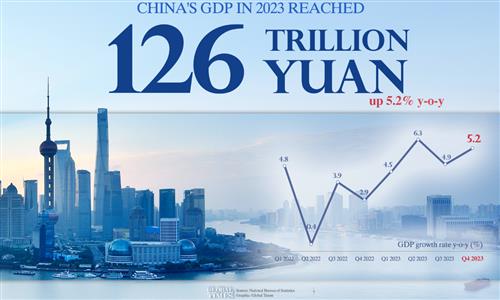China’s consumption in 2023 contributes 82.5% to GDP growth, with momentum from record-high sales to last in 2024

Locals and tourists play around ice sculptures in Zhaolin Park, Harbin, capital city of Northeast China's Heilongjiang Province, on January 1, 2024. Winter tourism boomed in Harbin, which received over 3 million tourists during the three-day New Year holiday. Photo: IC
China's consumption in 2023 played a vital role in bolstering economic development. Final consumption contributed 82.5 percent of overall GDP growth, while retail sales set a new record of 47.15 trillion yuan ($6.62 trillion), data from the National Bureau of Statistics (NBS) showed on Wednesday.
The booming consumption underscored China's steady progress from being an investment-driven economy to one that is consumption-driven, experts said, and the sector will remain an indispensible driving force for economic development this year.
China's consumption in 2023 demonstrated a continuous recovery, as retail sales grew 7.2 percent to a record high, Kang Yi, head of the NBS, said at a press conference.
Kang said that the sector re-emerged as the major driver of economic development. In 2023, final consumption drove economic growth by 4.3 percentage points, 3.1 percentage points higher than the previous year, while the 82.5 percent contribution to GDP growth was 43.1 percentage points higher than in 2022.
The record-high sales showcased China's strong purchasing power and great market potential, which are inextricably linked to the country's steady economic growth, rising incomes and optimized consumption environment, Wang Peng, an associate researcher at the Beijing Academy of Social Sciences, told the Global Times on Wednesday.
China's economy is shifting from being investment-driven to consumption-driven, said Hu Qimu, deputy secretary-general of the digital-real economies integration Forum 50.
In addition to supporting economic growth, the structural upgrading of consumption will promote the transformation and upgrading of the industrial sector, Hu told the Global Times on Wednesday.
Kang said the rapid recovery of services consumption and the continuing structural upgrading of household consumption were two highlights of the consumption sector in 2023.
For instance, the catering sector generated sales of 5.29 trillion yuan, up 20.4 percent. Retail sales of services grew 20 percent, 14.2 percentage points faster than retail sales of goods, according to the NBS data.
Rising services consumption, including in the cultural and tourism industry, gave the tertiary sector more of a role in China's economic development, Zhang Yi, CEO of iiMedia Research Institute, told the Global Times on Wednesday.
A recent example is thriving winter tourism in Harbin, Northeast China's Heilongjiang Province. The city saw 3.05 million tourist visits during the three-day New Year's Day holidays and generated 5.91 billion yuan in tourism revenue, new records in both cases, according to the local authority.
Zhang and Hu pointed to the rise of emerging industries and related models such as livestreaming, led by the fast-growing digital economy. These sectors contributed to consumption and made industries more efficient.
The economic benefit of domestic demand was significantly enhanced in 2023, Kang said. The contribution of domestic demand to economic growth reached 111.4 percent, an increase of 25.3 percentage points year-on-year.
Wang said strengthened domestic demand was a key driver of China's economic recovery and growth in 2023.
"Against the backdrop of a complex and volatile global economic situation, China has effectively withstood external risks and challenges and maintained stable economic growth through measures such as expanding domestic demand and promoting consumption," Wang said.
Kang said that there are multiple factors to support the sustained recovery of China's consumption, which is expected to maintain its growth momentum.
Kang said that the consumption potential is still huge, with a market of more than 1.4 billion people and a continuously upgrading consumption pattern. The foundation has been consolidated amid China's economic recovery, improved employment situation and steadily growing incomes.
The rapid development of new consumption patterns across a wide range of sectors from the digital industry to culture and tourism is injecting vitality into the consumption market, Kang noted, and stimulus policies will continue to stabilize the market and promote a consumption recovery.
Hu said that more policies to stimulate consumption will be rolled out.
Wang expected China's consumption to steadily progress in 2024 with stronger purchasing power and market confidence.


